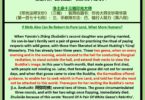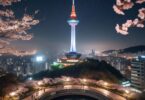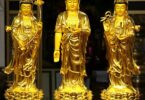[109] How Mindfulness Of Buddha Dissolved My Fears And Anxieties
念佛如何化解了我的恐惧和焦虑
My Birth Story
I was born under rather unusual circumstances. It was a typical weekday afternoon and my heavily pregnant mother was helping out at her parents’ provision shop in Clementi. Suddenly, she felt a heavy slap on her back and wheeled around to face a startling sight.
The person on the other end was an extremely old and shrivelled lady with very tanned skin, and she was holding an oil-paper umbrella typically used in Chinese funeral rituals. In Hokkien, she asked my mother if the shop sold Chye Tow Kueh (fried carrot cake), to which my mother responded in the negative.
As she watched her walk away, my mother felt the onset of labour contractions and promptly went into early labour. Whether this lady was a physical manifestation of my mother’s karmic creditor will never be known. (My mother had a previous abortion under doctor’s advice.) But it was clear that any karmic debt owed was not merely on my mother’s ledger, as that episode too marked the beginning of suffering in my formative years.
Early Health Conditions
Being born premature with undeveloped lungs, I suffered from respiratory distress syndrome. My parents, while not well-to-do, poured in their savings to ensure that I was well taken care of in the ICU under 24-hour supervision. While I survived that first ordeal, my childhood was marked by severe asthma, which led to several more hospital stays and notably, a permanent excuse from physical education (PE) in school.
Perhaps borne out of frustration with my own condition, I took to bullying small animals, especially longkang fish (drain guppies and swordtails). These misdeeds included throwing them against a wall, thus killing them.
As a practising Buddhist now, I constantly seek repentance (忏悔) for these acts. By causing immense fear and grievous hurt to other sentient beings, I realised with the benefit of hindsight that they led me into a downward spiral towards more pain and suffering.
Irrational Fears And Panic Episodes
While entering puberty helped strengthen my body and ease my physical ailments, my mind was pulled deeper into a pool of irrational fears. From encountering strange throbbing pains in my body to experiencing deep paralysing fears over my parents’ mortality, it became so bad that I even once entertained the thought of ending my life.
While the physical pain subsided when I entered college, fear never left me. I started experiencing panic attacks which left my body feeling numb, nauseous and on the verge of blacking out. The attacks were mostly stress-induced. As recollected, one occurred half an hour before I went on stage to lead the school in the National Pledge and college song (which formed part of my duty in a uniformed group).
Another one took place when my General Paper (GP) tutor screened an abortion video in class. At that moment, I could visualise myself experiencing the same pain my older sibling did while undergoing the dismemberment process shown.
But there were other panic episodes which were not stressed-related. I remember one happening in the year 2000 while watching the X-Men movie with my classmates in a cinema. The trigger was unclear but it was a clear sign that my condition was worsening.
My Mother’s Story
Miraculously, I continued to do well academically and secured a scholarship to study in a local university. However, happy days were still elusive. When my mother sank into severe depression in 2003, she turned catatonic and had to undergo electroconvulsive therapy as part of her recovery process. From being taken care of by her to taking care of her, I felt responsible for her condition, given the many tribulations she went through in raising a child like me.
As a non-practising Buddhist then, who knew nothing beyond offering joss sticks and clasping my hands in prayer, I remember slapping myself in front of the Guānyīn Bodhisattva (观音菩萨) altar at home and praying to shorten my life in return for my mother’s good health.
Perhaps with the help of neurostimulation and my sincere prayers, my mother recovered well enough to be discharged, although episodic relapses became part of her own life in subsequent years. I now recognise her condition to be karmic in nature (likely due to breaking of the precept against ‘killing’ when she underwent the abortion), as doctors were unable to ascertain a reason for her condition to prescribe a lasting cure.
Life At Work
I spent slightly more than four years working in the finance industry as part of my scholarship bond fulfilment and did well enough to be recommended for an overseas posting. However, it was at that instant that I knew I had to make a decision. While I was able to don a ‘mask’ at work to appear confident and outgoing, I knew that this was not my true nature.
I had also become better at managing my panic attacks (such as focusing on my exhalations when an attack sets in), but it did not mean I was cured. I distinctly remember stifling a panic attack over lunch with the Managing Director when he was quizzing me on areas I was not familiar with. I was also aware that rising up the ladder would expose me to more office politics and other difficult situations which I was not keen on. As a result, I left the organisation and pursued a career as a full-time tutor.
Encountering The Pure Land Teachings
With accumulated savings and more time on my hands, I sought to find a solution to both my mother’s and my own ailments. From fengshui to meditation techniques, every relapse pointed me in a different direction. Finally, I stumbled upon yoga and was introduced to the Pure Land (净土) teachings by my yoga teacher.
I experimented with Niànfó (念佛) and remember proudly declaring to my yoga teacher that I could chant 600 times during my first few tries. Deep inside my heart, I felt a sense of affinity with the Buddha’s name (Āmítuófó: 阿弥陀佛).
While quiet moments have hitherto been filled with thoughts of anxiety, uncertainty or fear, I felt that mindful chanting allowed me to remain calm and protected, which brought great relief, like a warm comforter blanket in the middle of a cold room.
Eager to learn more, I approached my yoga teacher who pointed me in the direction of 善知识 (good-knowing friends) and places which taught the Right Dharma (正法), focusing on the Pure Land Dharma Door (净土法门).
Furthering My Learning
I enrolled in Singapore Buddhist’s Lodge (SBL: 新加坡佛教居士林) Pure Land Dharma Class in 2018, and binge-watched YouTube recordings of Dharma talks given by SBL’s Venerable Yánxù (延续法师) and Venerable Dà’ān (大安法师: Abbot of Dōnglín Monastery: 东林寺方丈).
In 2020, through another Purelander, I contacted Teacher Shi’an to ask for a copy of Āmítuófó’s portrait, which turned out to be one of the most important doors I knocked on. I was subsequently added to his contact list and received a lot of useful Dharma information through his WhatsApp messages.
Looking back, getting acquainted with the right Dharma teachers proved to be a very important step in my Buddhist journey, as I had come across many ‘teachings’ online (especially in YouTube) which left me more unsettled.
For example, I remember hearing a view on how getting dementia meant the end of the person’s hopes of making it to Āmítuófó’s Western Pure Land Of Ultimate Bliss (西方极乐世界). This view was subsequently corrected by a 善知识 above.
Deepening My Practice
Armed with better understanding of Pure Land principles, I dived deeper into my practice. This time, I was no longer seeking a cure to my panic attacks or my mother’s depression. I have come to recognise and gladly accept that my eventful childhood and my mother’s own suffering have demonstrated the inevitable nature of suffering in this world, and the impermanent nature of worldly joys.
I was hence more than happy to seek refuge under Āmítuófó. Scarred by my own life experiences, on hearing about Niànfó and connection to Āmítuófó as an expedited way to break out of the cycle of rebirth, I could feel myself very quickly giving rise to the aspiration to leave this Sahā World (娑婆世界), to aim for rebirth in Āmítuófó’s Western Pure Land.
Taking Refuge And Receiving Precepts
Thus, I gratefully took the Threefold Refuge (三皈依) and received the Five Precepts (五戒) at SBL in 2019. I also became a full-time vegetarian in the same year (while working towards Buddhist veganism). Since April 2020, I have been committing to daily practice (定课) involving prostrations, recitation of Amitābha Sūtra《阿弥陀经》and Niànfó.
I attend regular Pure Land classes with Teacher Shi’an, and through these classes and SBL’s events, I maintain contact with a circle of fellow Purelanders. Along with daily repentance and sharing of merits (回向), I was able to feel the rejuvenation of my mental well-being. From fearing panic attacks, I have reached a stage where I have clean forgotten about the distress that they caused.
Encouraging My Mother
In my mother’s case, she has started daily chanting and is coping a lot better with her mental health issues. A few years ago, she shared with me that since young, she would chant Āmítuófó whenever she felt frightened (e.g. before entering the operating theatre), although she did not know the reason for doing so. While she is unable to remember who taught her to chant in the first place, the chanting brought her peace and calmness.
While sharing the key principles of the Pure Land teachings too, I encourage her to continue chanting. Although she is still reluctant to talk openly about death-related issues, she is now aware of Āmítuófó’s Pure Land, the Three Provisions (三资粮) of Faith, Aspiration and Practice (信愿行) and the importance of daily chanting.
My Path Ahead
Both my parents have also taken refuge in the Triple Gem (三宝) and each have a copy of Teacher Shi’an’s Pure Land Passport《净土护照》near their bedside to remind them on the importance of learning and practising the Pure Land teachings.
Now that Niànfó has nursed me back to health and shown me a clear purpose in life, I will continue in my endeavour to guide my parents and those whom I have affinity with, to share about Āmítuófó, and to inspire them to seek rebirth in his Pure Land. Námó Āmítuófó (南无阿弥陀佛)!
南无阿弥陀佛 : 净成
Námó Āmítuófó : Jìngchéng
13 March 2024





